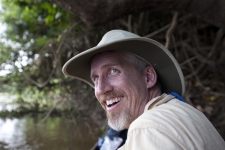By: Robert 'Max' Holmes, ARCSS Program Director

Having transitioned in January 2013 from being a scientist at the Woods Hole Research Center to a Program Director for NSF's Arctic System Science program (ARCSS), I thought it might be useful to share my initial impressions while they are still fresh on my mind. My dominant impression is one of respect for my new colleagues at NSF. They are all smart, hard working, and dedicated to funding the best science. They are also all scientists and they care deeply about scientific progress. They struggle, even agonize, about funding decisions and have to constantly weigh many competing priorities—internally and externally—that I am just now beginning to understand. Just as researchers can get demoralized by a string of unfunded proposals, so too are program directors impacted by having to decline so many strong proposals. But they keep at it, year after year, doing their absolute best to do the most with the resources they have. And I think it is safe to say that their greatest satisfaction is to play a role in the remarkable science that you do - so do great work and let your program officers know about it!
A surprise to me has been how much time program directors have to spend to get solid reviews for all the proposals they receive. Each proposal requires at least three reviews, and often you have to ask three people to get a single review. Thus, it is not unusual to have to contact more than ten reviewers to get the needed three reviews. I admit to now feeling guilty about all my late reviews in the past, or even worse, the review requests that somehow got buried in my inbox to which I never responded. I now also realize that each program director has ready access to my history as a reviewer—all of the times I've been contacted to do a review and all of the reviews that I've submitted. You develop a reputation as a reviewer—make it a good one. While the rating given to a proposal is important, the substantive comments about the proposal are far more important: little weight is given to ratings of "Excellent" or "Poor" if not supported with specific and substantive comments.
For my time at NSF, I plan to work most closely with Neil Swanberg to continue the evolution of ARCSS. As described in the companion article, we will do our best to fund research that advances understanding of the arctic system, and we will continue to work closely with the research community to identify funding priorities. As all are aware, these are challenging times fiscally, but the importance of the research demands that we all forge onward and continue to unlock the mysteries of the Arctic. I consider it an honor to be at NSF and to work with my remarkable new colleagues. I certainly will have a new appreciation for what they do when I return to my life as a researcher.
For further information, contact Robert 'Max' Holmes (rholmes [at] nsf.gov).
